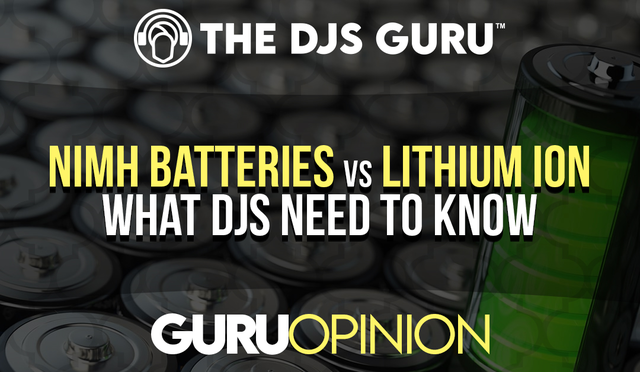Battery-Powered Lighting for DJs
If you’ve been a DJ for at least 10 years or so, you probably remember a time before battery-powered lighting. If you don’t, you’re lucky. While battery-powered lights have become ubiquitous in the event world, it wasn’t always so. Lighting up an entire room with uplights, for example, used to take a lot of time and cables. Thankfully, battery-powered lighting has become more and more accessible as the years pass. In turn, it offers DJs more flexibility and convenience for their events than ever before.
But did you know that not all batteries are created equal? When it comes to DJ gear, there are two main types of batteries in use. Each of these has its own strengths and weaknesses that DJs should be aware of. In this article, we’ll talk about the positives and negatives of these two battery types – NiMH and lithium ion – and how they apply to the DJ sphere.
Lithium Ion Batteries
Lithium ion batteries are extremely popular in many of the electronics we use every day. When compared to older lead-acid and NiCad batteries, they offer quite a few benefits. However, they are not without their flaws. Here’s what you need to know:
Advantages
- Lightweight: Lithium ion batteries are physically much lighter than batteries of years past. This is why they are found in so many of our cellphones, tablets, and other portable devices. When it comes to transporting battery-powered equipment, weight is definitely an important factor.
- Energy density: Lithium ion batteries have high energy density, which means they hold more charge per unit of weight. In essence, they do their “battery job” better than most.
- Less self discharge: Lithium ion batteries are great at holding onto their charge, even when not in use. If you’ve got lights sitting for a while, the batteries won’t run themselves down to 0 as quickly as other types.
Disadvantages
- Fire risk: One big downside to lithium batteries is their fire risk. While protection circuits have minimized this risk, it still exists. DJs using lithium batteries should follow proper battery storage and maintenance protocols to protect themselves and their property.
- Non-standard sizing: Lithium batteries are created to specific manufacturer sizes which are not standard. This means that if you need to replace a battery you’ll have to get it from the manufacturer and not off the shelf. Worry about compatibility is unfortunately a reality with lithium ion batteries.
NiMH Batteries
NiMH, or Nickel Metal Hydride, are another great battery lighting option that we don’t see used as much as lithium. Despite this, NiMH offers some really great perks that you don’t see in other battery types.
Advantages
- High durability: NiMH batteries are very hardy. They resist large swings in temperature and outside conditions well without losing charge. This is super handy when you find yourself in a large variety of locations like outdoor summer events and frigid winter celebrations.
- Standardized: No battery lasts forever, and NiMH batteries are created to universal standard sizes. This means that if your battery were to go bad and you needed a replacement in a hurry, you could most likely find one relatively easily.
- Life cycle: NiMH batteries can withstand many discharging and recharging cycles for years of continued use. Week after week, month after month, NiMH batteries will be ready to go at your events.
- Airplane friendly: Due to concerns about fire, transporting lithium batteries can be a bit of a hassle. NiMH, on the other hand, has less restrictions for travel. If you’re a DJ who finds himself flying to events often, this is something worth considering.
- Cost: NiMH are generally more affordable than lithium batteries. Going along with their standard sizing, this means that your wallet won’t take as much of a hit if you end up needing to replace some.
Disadvantages
- Memory effect: The biggest downside of NiMH batteries is their memory effect. When not fully charged and discharged from time to time, their capacity can decrease. This means increased maintenance burden on users.
- Self discharge: When compared to lithium ion batteries, NiMH cells will self discharge more quickly. If your batteries are sitting unused for long periods of time, you may find them without any charge when you go to use them. If you’re someone who takes their lighting out every weekend, this shouldn’t be an issue for you.
Battery-Powered Lighting – Final Thoughts
Hopefully, you’ve been able to see the pros and cons of two of the most popular battery types we see in DJ lighting today. While lithium may be the most popular, don’t discount NiMH options, as they bring some great and unique qualities to the table. Whichever you choose, by following good battery maintenance guidelines you should enjoy many trouble-free years from your battery-powered lighting.



